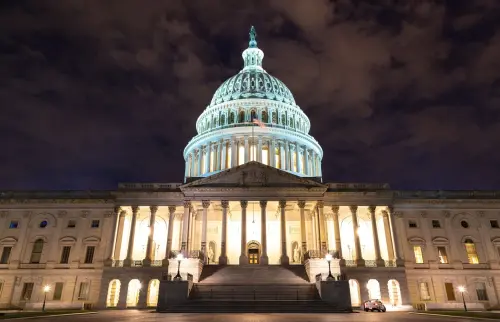

The vast majority of federal employees are proud of their jobs and believe their work contributes to the public good, but report that a lack of resources and continued downsizing have made accomplishing their mission more difficult than necessary, according to a new report issued today by the Brookings Institution’s Center for Public Service.
Federal employees also say they contribute to their agency’s mission, and half characterize their organizations as very good at helping people. The majority also say that the people they work with are open to new ideas, willing to help other employees learn new skills, and are concerned about their organization’s mission.
Unfortunately, these positive views are tainted by persistent perceptions among the workers that the federal government does not give its employees the tools to do their jobs well. Substantial minorities say their organizations do not have enough access to information, technological equipment, and training, and a majority believes their organizations do not have enough employees to do its job well.
“Overall, the survey suggests that the federal government has a much better workforce than it deserves,” says Paul C. Light, author of the report and director of the Center for Public Service. “Our survey clearly shows that the federal government spends too much time experimenting with the latest management fads and too little time providing its employees with the information, technology, training, and staff needed to achieve the government’s mission. Day after day, it asks too many of its employees to do the nearly impossible.”
The report is based on a first-ever survey of 1,051 federal government workers and 500 private sector employees conducted between February 7 and June 1, 2001. Federal employees were contacted at home and given a rare chance to talk candidly about their work without a supervisor looking over their shoulder. Federal workers and private sector workers across their respective workforces were weighted to reflect their relative percentages among the overall workforce.
Federal employees also say they contribute to their agency’s mission, and half characterize their organizations as very good at helping people. The majority also say that the people they work with are open to new ideas, willing to help other employees learn new skills, and are concerned about their organization’s mission.
Unfortunately, these positive views are tainted by persistent perceptions among the workers that the federal government does not give its employees the tools to do their jobs well. Substantial minorities say their organizations do not have enough access to information, technological equipment, and training, and a majority believes their organizations do not have enough employees to do its job well.
“Overall, the survey suggests that the federal government has a much better workforce than it deserves,” says Paul C. Light, author of the report and director of the Center for Public Service. “Our survey clearly shows that the federal government spends too much time experimenting with the latest management fads and too little time providing its employees with the information, technology, training, and staff needed to achieve the government’s mission. Day after day, it asks too many of its employees to do the nearly impossible.”
The report is based on a first-ever survey of 1,051 federal government workers and 500 private sector employees conducted between February 7 and June 1, 2001. Federal employees were contacted at home and given a rare chance to talk candidly about their work without a supervisor looking over their shoulder. Federal workers and private sector workers across their respective workforces were weighted to reflect their relative percentages among the overall workforce.
Public Versus Private
The report found that Uncle Sam’s workforce is motivated more by the nature of the work and the public good than a matched sample of the private sector workforce. A little more than 30 percent of federal employees say their main motivation in coming to work every day is to pick up a paycheck—compared to almost half of private employees who say that money is the motivating factor. Additionally, private sector workers are less happy with their work, salary, and benefits than their federal counterparts, and they don’t think they have as much opportunity to accomplish something worthwhile.
On the other hand, private sector employees are more positive about their organizations’ hiring systems, calling them fast, simple, and fair. Government employees are more likely to describe the federal hiring process as slow, confusing, and not necessarily fair.
Private sector employees clearly have a higher opinion of their senior leaders than federal employees do. And while federal and private sector employees are equally satisfied with their opportunities to advance and develop new skills, private sector workers consistently report a higher level of support from their organizations.
Both federal workers and those in the private sector have survived their fair share of management reform efforts in recent years. But private sector employees say they have been “reformed” less frequently—and that the efforts have had a much more positive impact. Private sector employees say their employers ask more of poor performers and that their organizations do a good job of disciplining those who don’t measure up.
The Talent War
The federal government has failed to make federal employment attractive to the most talented Americans. The federal government is running dead last as the destination of choice for graduates of the nation’s top public policy and administration graduate schools. Three-fourths of the classes of 1973 and 1974 went to government for their first jobs, compared with just 49 percent of the class of 1993. Also, five years into their new jobs, students from the classes of 1973 and 1974 were much more likely to still be in government than were students from the class of 1993.
The federal government is particularly inept in advertising its jobs. According to a 1999 study by the Office of Personnel Management, as many as one-third of all job openings are not publicly announced, let alone posted on the agency’s job-seekers website.
Dazed, Downsized, and Reinvented
Staffing is where federal employees find the greatest fault with their organizations—and no wonder. The federal government has spent the last 15 years trying to cut its civilian workforce. The continued downsizing and outsourcing has left federal employees believing that their organizations do not have enough employees to do its jobs well. Overall, only 15 percent of those surveyed say their organizations always have enough employees, 25 percent say often, 34 percent say sometimes and 25 percent say rarely.
Whereas 59 percent of federal employees say their organizations sometimes or rarely have enough employees to do their jobs well, only 41 percent of private sector employees agree. That may help explain why federal employees have little good to say about how Congress and the president have acted regarding the management of their organizations. Sixty percent of federal managers say Congress generally acts in ways that worsen the management of their organizations, and 41 percent say the same of the president.
Federal employees also believe the reinventing government efforts of the last five years have failed. Of the 73 percent who report that their organizations have been reformed or reinvented in the last five years, 49 percent say that the changes have made their jobs either somewhat or a lot more difficult. Efforts not directly tied to reinventing government scored higher. Nearly 90 percent of high-ranking officials say the government’s effort to improve information technology has been very or somewhat successful, and 67 percent say attempts to reduce fraud, waste, and abuse in federal programs have achieved success.
he Poor Performance Problem
A much more troubling portrait of poor performance emerges when federal employees were asked to give a specific estimate of the number of their fellow workers who are not performing their jobs well. On average, the employees interviewed for this report estimate that 23.5 percent of their co-workers are not up to par. Only five percent say that all of their co-workers do an effective job.
Asked what might explain the level of poor performance, federal employees and managers are not particularly forgiving toward either their organizations or the poor performers. Only 16 percent say the poor performers do not have the training to do their jobs well. A little more than 30 percent say the poor performers are simply not qualified for their jobs, and 37 percent say their organizations do not ask enough of those employees.
Unfortunately, federal employees share a belief that little can be done about the poor performance problem. Only 30 percent say their organizations do a very good job or somewhat good job at disciplining poor performers, compared with 67 percent who say they do not.
About the Report and The Center for Public Service
This report is based on a nationwide, representative telephone survey of 1,051 federal government workers and 500 private sector employees, conducted under the direction of Princeton Survey Research Associates (PRSA). Interviewing was conducted between February 7 and June 1, 2001. PRSA interviewed federal workers across the workforce: 177 Senior Executive Service (SES) members; 107 Presidential Management Interns (PMIs); 213 General Schedule managers and supervisors, and 554 GS employees. PSRA interviewed 247 private business managers and supervisors and 253 private rank-and-file employees. The margin of error for the federal workers sample is plus or minus four percent; the margin of error for the for-profit sample is also plus or minus four percent.
The Center for Public Service was established by the Brookings Institution in 1999 to monitor the state of the public service today, and ask how the public sector can be more effective in both inviting talented Americans to serve and providing the kind of challenging work that talented Americans seek. The Center for Public Service is supported by grants from the Dillon Fund, the Ford Foundation, the Smith Richardson Foundation, the David and Lucile Packard Foundation, the Atlantic Philanthropies, and by James A. Johnson, chairman of the Brookings Institution.
Paul C. Light, the author of the report, is the director of the Center for Public Service and vice president and director of Governmental Studies at the Brookings Institution. For a full copy of the report, visit the Brookings Institution website at brookings-edu-2023.go-vip.net. Interview requests with Dr. Light should be directed to Gina Russo at the Brookings Institution, 202-797-6405.

Elizabeth Ananat, Anna Gassman-Pines, Olivia Howard
May 22, 2025

Michael E. O’Hanlon, Kathryn Dunn Tenpas
May 22, 2025

Zaria Roller, Tara Watson
May 21, 2025